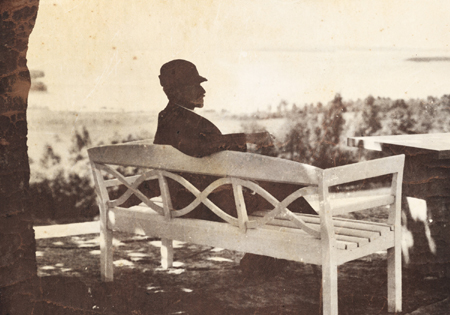 |
Den schwedischen Lyriker VERNER VON HEIDENSTAM (1859 bis 1940, siehe Artikelbild) haben wir auf NONPOP schon einige Male erwähnt, stets in Zusammenhang mit der schwedischen (Neo)Folk-Gruppe SOLBLOT. Ihre Texte basieren zum großen Teil auf seinen Gedichten. VON HEIDENSTAM ist einer der bekanntesten schwedischen Lyriker. Er beschäftigte sich in Zyklen mit verschiedenen Themen, auch mit Politik. Zum Beispiel forderte er in einem seiner berühmtesten Gedichte das allgemeine Wahlrecht, gründete später die renommierte schwedische Tageszeitung "Svenska Dagbladet", um mehr politischen Einfluss zu erhalten. Vor allem gilt er aber als wichtigster Vertreter der schwedischen Neuromantik, der mit seinen Arbeiten Landschaft und Gebräuche des Landes sowie die nordische Sagenwelt pries. Sein bekanntestes Prosawerk ist "Karolinerna", in dem er sich vor historischem Hintergrund mit der Idee des 'Übermenschen' von NIETZSCHE beschäftigte. 1916 erhielt VON HEIDENSTAM den Nobelpreis für Literatur.
Nun ist es nicht erstaunlich, dass SOLBLOT aus ihrer Bewunderung heraus ein Buch veröffentlichen werden, welches VON HEIDENSTAMs Gedichte in Erinnerung rufen soll. Es wird ausgewählte Originalwerke des Lyrikers enthalten, aber auch Übersetzungen ins Englische und Deutsche. Das umfassende Vorwort hat uns SOLBLOT vorab in einer gekürzten Form zur Verfügung gestellt. Es handelt sich um einen Artikel von CHARLES WHARTON STORK (1881 bis 1971), selbst Lyriker und Dramatiker, vor allem aber Übersetzer skandinavischer Gedichte ins Englische. Sein Vorwort findet Ihr im Anschluss, drei der ins Englische übersetzten VON HEIDENSTAM-Gedichte auf der folgenden Seite. Wann das Buch erscheint und was es kosten wird, geben wir bekannt, sobald es feststeht. SWEDEN'S LAUREATE Selected poems of Verner von Heidenstam It was upon a field of combat that Heidenstam made his debut with his first volume of poems in 1888. The old sentimentalism had largely disappeared and a fierce war was being waged between the extreme, unmitigated realists and the new, more vital idealists. Into this combat Heidenstam at once plunged on the side of the idealists along with two other distinguished poets, Gustaf Fröding and Oscar Levertin. Fröding is at once the Burns and the Heine of Swedish poetry; he not only represents with inimitable spirit the life of the peasant, he can also - in moods ranging from whimsical humor to deep pathos - reveal the tragedy of his own brief career. This most brilliant of Swedish poets, who is still today the idol of his countrymen, broke down from dissipation in 1898 and, though he recovered his reason and lived on until 1911, never regained the lost magic of his art. Oscar Levertin, of Spanish-Jewish descent, has a more mystical and aesthetic bent. He is the typical poet of the ivory tower, a notable critic and finished stylist, whose ill health gave his imagination a somewhat morbid tinge. He died in 1906. The genius of Heidenstam, if not the most dazzling, has at least proved itself the most healthy and robust of the group. We now pass to the external events of Heidenstam's life. He was born July 6, 1859, of noble family, in southern Sweden, the seat of one of the earliest continuous civilizations in Europe. Families of that region trace back their descent a thousand years or so and reach no record of having come from anywhere else. The landscape is mostly flat, but broken by many lakes and largely covered by the wild forest of Tiveden. Within sight of the poet's home stands the castle of Vadstena, built by Gustaf Vasa. As a boy the poet was shy and a great reader, especially of poetry and battle stories. At school he was fondest of Latin and geography. When sixteen years old he had a nervous illness and by the doctor's advice was sent to the South, where he sojourned mainly in Italy, Greece, and the Orient. His wanderings lasted many years with occasional visits home, during one of which he was married. Finally, impressed by the visual beauty of the scenes in which he lived, Heidenstam resolved to become a painter and, despite the dissuasion of his family, went to Paris and studied for a time under Gerome. Though he enjoyed the care-free life he was dissatisfied with being only able, as he felt, to touch the surface of things. He longed for home but, having become estranged from his family, he was obliged to remain an exile. In a fit of discouragement he isolated himself from the world at the old castle of Brunegg in Switzerland. Here he saw no one but his wife and occasionally August Strindberg. At last, however, his real talent came to light, and amid these gloomy surroundings Heidenstam composed a series of dramatic poems and poetic sketches which fairly glowed with the warmth and color of Paris, Italy, and the East. In 1887 he was summoned home to the death-bed of his father and in 1888 his poems were published under the title, Pilgrimages and Wanderyears. Heidenstam's first book, despite the fact that it was considered "exotic" and "peculiar," had a brilliant success; it was in fact pronounced one of the most remarkable debuts in Swedish literature. Of the poetry in itself we shall speak later. Suffice it here to say that Heidenstam, no longer in doubt as to his true vocation, settled down once more in his native region to fulfill his artistic destiny. From then on his life has been the succession of prose and poetry volumes that came from his pen. In his Poems, published in 1895, Heidenstam comes much nearer to finding himself. These are alternately narrative, descriptive, and reflective, and are nearly all about Sweden. There is a concentration, a firmness, a strength in them as of Antaeus in contact with his mother earth. The same spirit pervades his collections of tales from Swedish history and legend, works which by their vivid and forceful style ranked their author as high in prose as he already stood in poetry. His third poetical volume, New Poems, appeared in 1915. These poems are like a trumpet-call to his people, a summons to awake and renew in the present the glories of the past. Heidenstam's former doubts and struggles are largely replaced by a calm dignity of outlook. The self-centered man has forgotten his despondency by merging himself into the larger soul of his country. To those familiar with his claims to the honor, it came as no surprise that in 1916 Heidenstam was awarded the Nobel Prize for Literature. Where indeed is there in Europe today a writer of more sincerity and inborn originality? After our survey of Heidenstam's poetry we may naturally ask in how far his message may carry to the world at large. May not this largely patriotic master be of importance only to those of his own speech and land? To this we answer that there is nothing which Heidenstam writes for Sweden that is not almost equally applicable to any other country. The problems he deals with, whether national or personal, are our problems. As one of the great fighting minds of this generation, he cannot fail to inspire all earnest thinkers with whom he comes in contact. Furthermore he is a great artist in presenting vivid scenes from the human drama, both subjective and objective. He boldly represents life as he knows it in the light of a militant, optimistic imagination. It can therefore hardly be doubted that, wherever his poetry can be made accessible, he will exercise a quickening and exalting influence at least equal to that of any poet now writing. CHARLES WHARTON STORK Philadelphia 1919 => Gedichte 
Michael We. für nonpop.de
Themenbezogene Artikel: » Entweder / Oder mit SOLBLOT » SOLBLOT: För Mig Finns Ingen Väg Från... » SOLBLOT - Nostalgie, Neofolk, Nackedeis » SOLBLOT: Sommarsång + Soluppgång Themenbezogene Newsmeldungen: » Erstes SOLBLOT-Album endlich erschienen » Solblot Live - Mp3
Namentlich gekennzeichnete Beiträge spiegeln ausschließlich die Meinung des jeweiligen Verfassers bzw. Interviewpartners wieder. Nachdruck (auch auszugsweise) nur mit schriftlicher Genehmigung durch den Betreiber dieser Seite.




|








